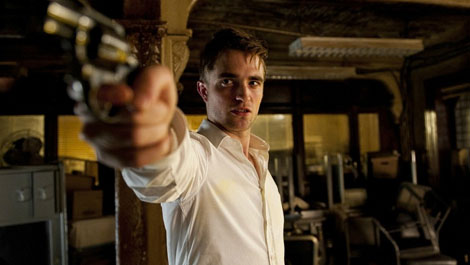Why you can trust GamesRadar+
A hard-bodied hooker with a laser-sighted weapon. Robert Pattinson blasting a bloody hole through his left hand. A pounding nightclub. A man stabbed in the eye. A modified handcannon. Naked bodies. A giant rat prowling crowded city streets. Gunfire. Graffiti.
Tantalising images flash by in the teaser for Cosmopolis , indicating that director David Cronenberg is blazing back to his dark, florid psycho-horror heritage after the taut austerity of A Dangerous Method . Nothing could be further from the truth.
Not only is Cosmopolis more talky and less cinematic than Cronenberg’s previous drama, it might just be the weirdest movie of the year.
After an enigmatic opening credit sequence splashed with earthy streaks of paint, the first thing Cosmopolis shows us is a big close-up on the grinning front-grill of a white limousine. It’s definitely grinning at us. Because, as those splattery credits cheekily winked at, this is an art movie.
Cinema, they say, is the art of showing and not telling. Not according to Cronenberg. After a prowling opening shot, his camera barely moves. “Those aphoristic little ideas about cinema, that’s bullshit,” he declared after making A Dangerous Method . “To me, cinema is a face talking.”
And that’s Cosmopolis right there: talking, talking, talking. It’s the least commercial film he’s made in the last 10 years. Or maybe ever. Except for one thing. The face doing the talking has made more than $2 billion at the box office and causes teenage girls to instantly lose consciousness, sanity or both.
“I want more,” Robert Pattinson tells a prostitute armed with a taser, after a sex scene that sizzles hot enough to set Edward Cullen’s hair gel alight. “Show me something I haven’t seen before.” Well, exactly. How about the star of Twilight screwing Juliette Binoche in the back of a limo, pissing in said limo and even getting a prostate exam in the backseat?
Pattinson as a bored twentysomething on a personal odyssey to destroy what he has in search of an exciting, dangerous future? The more you think about it, the more it becomes perfect casting.
Pattinson plays Eric Packer, a billionaire travelling across Manhattan in a limo to get a haircut. One by one, a series of characters join him for lengthy, chewy, intriguing and sometimes indecipherable conversations that feel like brain synapses firing at random.
By the time the scissors come out, he’ll have lost his wife (the glacially beautiful Sarah Gadon, Jung’s wife in A Dangerous Method ), been mobbed by angry protesters, been stalked by two very different pursuers, been ridden by two extremely hot women and committed startling acts of violence against himself and others. Mostly, though, he’ll have done an awful lot of chin-wagging.
Samantha Morton puts the modern world to rights (“The idea is time. Money makes time. It used to be the other way around”), Mathieu Amalric goes blond and beardy as an anarchistic protester and driver/bodyguard Kevin Durand (Little John in Ridley Scott’s Robin Hood ) tries futilely to keep him out of trouble.
“Do you ever feel sometimes that you don’t know what’s going on?” asks Jay Baruchel, one of the first visitors to Packer’s limo. Well, get used to that feeling. Sex, death, money, power... It’s all here, somewhere.
But really, this is about a man tearing his world apart to see what’s there – and you get the feeling that’s exactly Pattinson’s game plan. Water For Elephants (beaten by Christoph Waltz’s henchmen) and Bel Ami (seduce-anddestroy in 19th-Century Paris) have hinted at his urge for darker roles, but Cosmopolis is a game-changer for him.
He’s distant, sardonic, nihilistic, enigmatic and very watchable. It’s intriguing to imagine how different it might have been with original lead Colin Farrell, a man with proven shadowy sexual charisma ( Fright Night ) and compact star power ( Phone Booth ).
But Cronenberg has helped lift another level of performance from Pattinson, who channels his vampiric blankness for deeper purposes and never disappears completely behind Packer’s black suit and shades.
Cinematographer Peter Suschitzky’s precise, clinical visuals put Pattinson under intense scrutiny. But he chews through the challenge of Cronenberg’s immensely literate script – lifted hand over hand from the prose in Don DeLillo’s dense, stylish novel – with real confidence.
Inside that white stretch limousine, we’re almost in black box theatre. It’s a soundproof, leather-seated cocoon fitted with computer screens where the outside world almost looks like back projection.
Although we exit the vehicle several times, it’s not until the final scene – where Packer’s mysterious attacker reveals himself – that Cronenberg starts subtly stretching the visuals.
At one point, the director’s clever framing has a character appearing to reach into Pattinson’s head. Looks like he found something.



